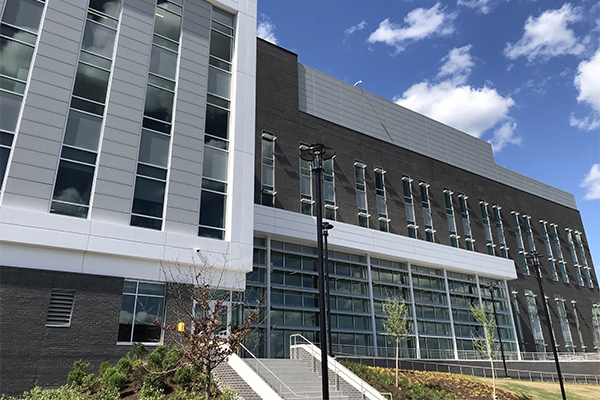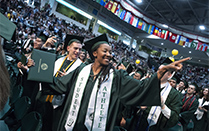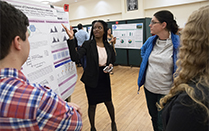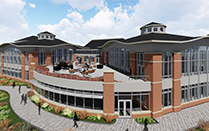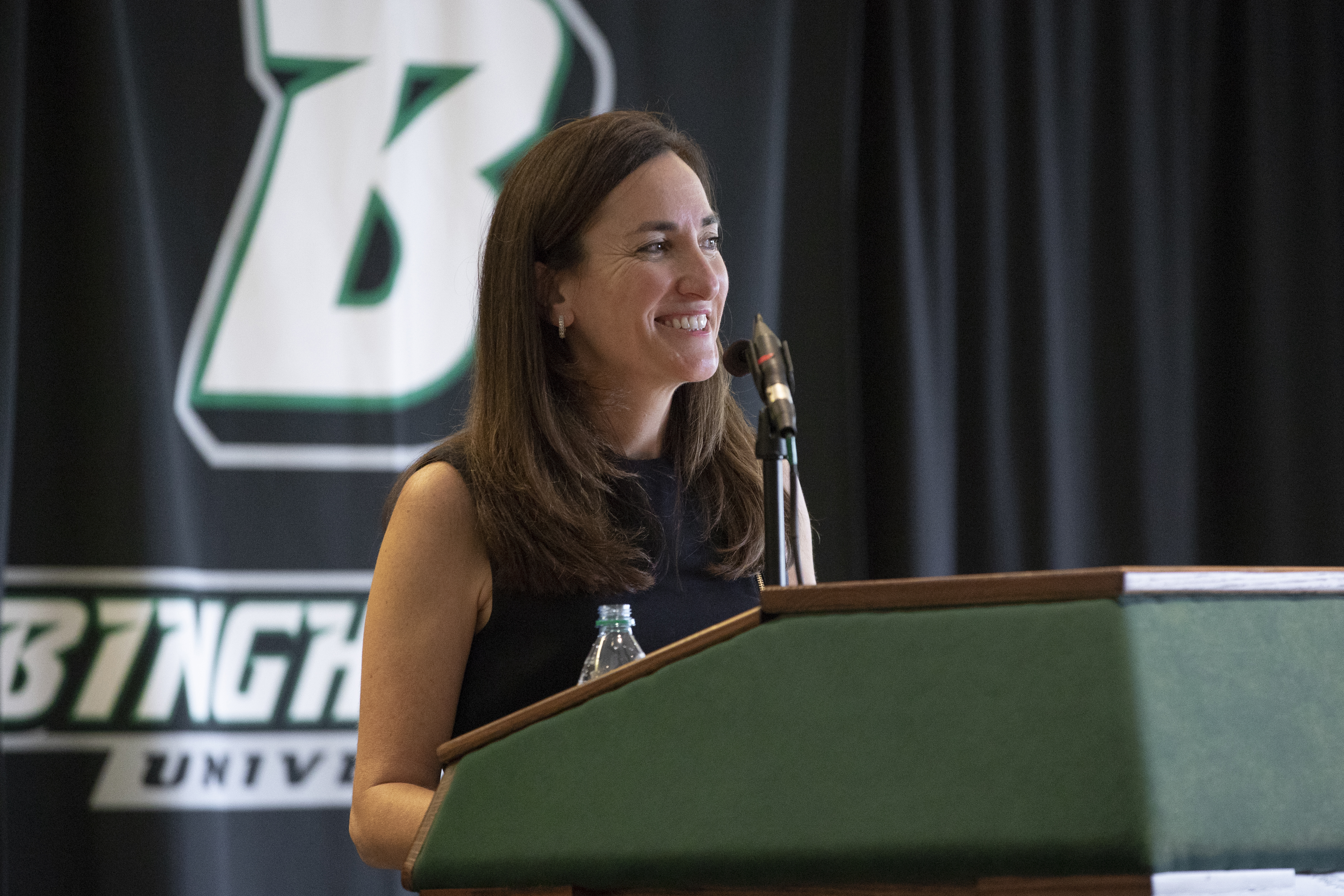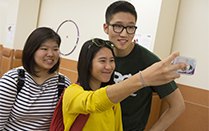Binghamton University President Harvey Stenger's Road Map Quarterly Report - June 30, 2018
This quarter was among the most trying I’ve faced during my time at Binghamton. These past three months were marked by terrible tragedy, but also excitement for the future. During this time, I’ve been impressed by the resilience and care for one another that defines the Binghamton community. The University’s inherent optimism was the most noticeable feature of the past three months and helped sustain the campus during a very challenging period.
Of course, we have lots to be optimistic about these days. We continue to make progress on our Road Map and the Health Sciences Campus that developed from it. Faculty are receiving plaudits for their research and scholarship, and we continue to add new academic programs to meet the changing demands of students. Demand for a Binghamton education is at a record high, Commencement recently added to the ranks of our alumni and next fall’s incoming class is already becoming acquainted with the campus.
Binghamton is a growing, evolving institution, and like all campuses its size, there are times when tragedies occur, occasions when people are injured, and periods of sadness and hurt. I am proud that ours is a campus that shows the best of itself during these times, even as we learn from our experiences how we can make the campus a better, safer place.
Student deaths and communicating with the campus community
As the quarter began, the University was shocked to learn that senior nursing student Haley Anderson had died in an off-campus apartment the morning of March 8. This was followed just five weeks later by the death of freshman engineering student Joao Souza, who died in his residence hall on campus. Most distressing was the fact that both were killed by other students. In both cases, the subject was quickly identified and arrested, although in the case of Haley’s death, the suspect fled to Nicaragua, where he is currently detained awaiting extradition. These deaths shocked and dismayed our campus.
Students were understandably upset, particularly by Joao’s death on campus over a weekend. Because of this, classes were canceled the following Monday and our Dean of Students Office and CARE Team, along with the University Counseling Center (UCC) and Residential Life, stepped in to provide counseling services for students. Faculty were advised to be understanding of students’ concerns and to be flexible regarding academic deadlines. Students also organized a well-attended memorial for Joao, and Haley’s fellow students memorialized her during May’s Commencement ceremonies.
Immediately following Joao’s death, we began a review of safety and security policies, trainings and orientation activities to ensure that our students, faculty and staff know what to do in crisis situations. Some initiatives include enhancing our B-Alert emergency notification system to speed messaging to the campus, making the B-Alert system an opt-OUT instead of an opt-IN program for our students, installing additional security cameras in residence halls and adding three counselors to our University Counseling Center staff. These changes were highlighted in a series of communications my administration provided to the campus community that are available on my homepage.
As the semester wound down, we also took time to reach out to the campus to describe the University’s progress on our diversity and inclusion initiatives. This communication followed several incidents where students, particularly our students of color, expressed concern about racism and discrimination on campus and the University’s response to it. In addition, LGBTQ students participated in a “Day of Silence” to raise awareness of the challenges they face. We strive to be a place where students, faculty and staff can learn and work freely and productively, without regard to race, ethnicity, religion, gender or sexual identity. Over the course of the past year, campus offices, schools and divisions have offered and participated in numerous programs, training sessions, seminars and panel discussions that focused on reducing racial inequality, fostering inclusivity, supporting civic and political engagement, and promoting social justice. Overall, there have been dozens of individual programs and hundreds of hours of work devoted to these concerns.
Admissions
We also provided our orientation and campus tour staff with communications support regarding these issues so they are better able to address questions from new students and family members, many of whom have been on campus for our open houses and orientation sessions. This year, we received a record 38,714 freshman applications for fall admission – up 16 percent from last year – as well as 4,760 transfer applications.
Only about 40 percent of our applicants receive acceptance notifications. This makes us one of the most selective schools in New York. And because the number of applications we receive each year is increasing, the quality of our students will continue to increase, even as we are planning to grow our freshman class by about 150 to 2,850 students next year. Significantly, 18 percent of our students are from out of state, meaning that our reputation is growing in places other than New York.
Turning to graduate student admissions, the big story for the past two years has been the decline in international graduate student applications to universities in the United States. This is a national trend, with estimates of the decline ranging anywhere from 1 to over 7 percent, depending on how the data are tabulated. Several factors account for this decline, but especially important are changes in national immigration and visa policies that have created an impression that the United States is less welcoming to international students than in the past. In addition, several other countries, including Canada, Germany, and Australia, have made it a national strategic priority to attract a greater share of the global international students to their universities.
These trends have significantly affected the number of international graduate student applications to Binghamton University. We are down 18 percent in complete applications compared to last year. However, helping to offset this, we are seeing increased interest from students within the United States. Domestic graduate student complete applications are up 9 percent from last year, so overall, we have a net loss of 7 percent in complete graduate student applications.
These fluctuations in applications can have an impact both on student quality and campus revenues, as many graduate students, especially those from other nations, pay full tuition. We expect this trend to continue at the graduate level for the foreseeable future. The Provost’s Office, the Graduate School and all of our colleges are working hard to come up with ways to adjust to this reality.
Research, rankings and new academic programs
Helping drive the increase in domestic graduate applications is the increasing visibility of our faculty’s research and scholarship and the growing reputation of our graduate academic programs.
Research and scholarship conducted by Binghamton faculty is frequently highlighted in the public press and disciplinary journals. For example, history professor Anne C. Bailey is receiving outstanding reviews for her new book, The Weeping Time: Memory and the Largest Slave Auction in American History, which chronicles the operations of slave auctions and traces the lives of the enslaved and their efforts to recreate family bonds after being sold.
Adam Laats, professor of education and history, was featured in numerous national publications others for his article on why the conservative bastion Liberty University chose liberal evangelical icon Jimmy Carter to speak at its commencement.
And Ali Aper Yayla, associate professor in the School of Management, has been featured in several publications for his research that revealed that when trying to entice people to invest in a product on a crowdfunding website, potential funders are more concerned about one’s ethical characteristics than one’s actual ability to make and deliver the product.
Our faculty’s innovative work is helping raise the profile of our graduate programs. Recently, U.S. News & World Report compiled a ranking of graduate programs in the United States and, of these, eight of Binghamton’s graduate programs finished among the top 100 programs in their discipline. These include our School of Management, our public affairs program, social work, mathematics, political science, history, psychology, English and sociology, with a number of other programs ranked on the cusp. What is most impressive about these rankings is that for most of them, we are improving our scores from year to year — for example, our management program moved from 88 last year to 76 this year, and our public administration program has improved from 63 to 59.
We are also adding new academic programs that are attracting attention from potential students. For example, beginning in 2020, students will be able to learn and conduct research at our new Living Building at Nuthatch Hollow, plans for which were unveiled in April. The Living Building will be a place for research and collaboration in a facility that will employ smart-energy technology and, most important, be a “passive house,” meaning that it will be net positive in terms of energy and water usage. The proposed design uses such architectural and design elements as bio retention to hold and clean water runoff, use of native plants and plant material for construction, a green roof and information nodes that describe the design features. I’m very excited about this building which, when completed, will be among just a handful of certified Living Buildings worldwide.
We also continue to develop innovative programs for graduate students. We recently submitted a proposal to SUNY that would allow us to develop a new academic program in human rights. This new Master of Science program evolved out of our new Human Rights Institute, co-directed by professors David Cingranelli of our Political Science Department and Alexandra Moore from our English Department. The program will focus on training advanced students for careers in human rights advocacy and research. If approved, it will also complement the work of our interdisciplinary Institute for Genocide and Mass Atrocity Prevention (I-GMAP) that was established last year through the engagement of Owen Pell ’80.
The Watson School of Engineering and Applied Science also has several new programs in development, including a certificate program in cybersecurity, a Master of Data Science and Analytics, a Master of Information Systems and a Master of Engineering Management, all of which are preparing students for in-demand fields. Students in the College of Community and Public Affairs can now enroll in our new Master of Public Health program, which prepares students for a broad range of healthcare and public policy careers, and our new Master of Public Archeology that serves as a starting point for careers in the environmental, engineering, energy and architectural fields as well as governmental sectors. These programs will play an important role in attracting future students and maintaining the strength and relevance of our graduate programs.
Commencement
In May, we had a very successful series of commencement ceremonies, conferring nearly 4,000 degrees for bachelor’s, master’s and doctoral candidates. Local hotels and restaurants were at full capacity with over 22,000 guests on campus and, if we add in the graduates, over 26,000 people crowded the establishments surrounding campus.
During the ceremonies we conferred three honorary degrees on exemplary alumni and scholars. Receiving an Honorary Doctor of Laws was Asunción “Sunny” Cummings Hostin ’90. A former federal prosecutor, columnist, social commentator and currently senior legal correspondent and analyst for ABC News, she has since 2016 been co-host of ABC Daytime’s morning show The View.
Receiving an Honorary Doctor of Humane Letters was Ali Çarkoğlu, PhD ’94, a professor, higher education administrator and accomplished political scientist from Turkey. His scholarship has focused on the establishment of democratic traditions and the rise of conservatism in Turkish politics. He also has played a key role in helping set up and organize the dual-diploma program in Global and International Affairs that links Binghamton with his home campus.
Also receiving an Honorary Doctor of Humane Letters was Aaron Mair ’84. One of the founders of the environmental justice movement, he is an epidemiological-spatial analyst with the New York State Department of Health, and an ad-hoc public health community disaster responder, including for the World Trade Center disaster. In May 2015, he was elected the 57th president of the national Sierra Club, the first African-American to hold the position.
Something new this year was the Tekes Siyum Commencement Ceremony that we held Friday, May 18, for our observant Jewish students. This year, Commencement coincided with the Jewish Holiday of Shavuot, the Feast of Weeks, and these students would otherwise have been unable to participate.
Progress on the Health Sciences Campus and Road Map Renewal
We’re also getting close to the opening of the new School of Pharmacy and Pharmaceutical Sciences in Johnson City. Site cleanup is nearly complete, and mechanical equipment is installed and running. We are currently looking for a date for Gov. Andrew Cuomo to come to the area to help us celebrate the building’s dedication. Faculty are preparing to move in next month, and the first classes will be taught in the new facility beginning in August.
Similarly, work continues apace on the renovations to the Decker School of Nursing and the other facilities associated with Health Sciences Campus in Johnson City. Design work is nearly complete to renovate and construct an addition to an old factory building at the campus and is on track to go to bid for construction in July. The renovation plans include classrooms, simulation labs, offices, advising and conference space, an information commons and public spaces as well as mechanical, electrical and plumbing upgrades.
Meanwhile, Dean Mario Ortiz of the Decker School is working to enhance the school’s offerings as part of the University’s Road Map Renewal, which is the most recent elaboration of our strategic plan. This will include expanded offerings from the Decker School and increased collaboration between nursing, pharmacy, the Watson School and our School of Management. Most importantly, we will add new programs in occupational, physical, speech and audiology therapy. The school has received approval to hire directors and has set an aggressive timeline to enroll students for these new programs.
We also are making significant progress on our new Presidential Diversity Post-Doctoral Fellowships, designed to attract minority faculty to campus. SUNY has supported the program with a $332,000 Performance Improvement Fund (PIF) grant that requires our campus to put up matching funds, so the program is well-supported. These post-docs will be for two years, with an optional third year depending upon the discipline. The first cohort of post-docs is expected this fall.
Perhaps the most complex of the Road Map Renewal projects is the Data Science Initiative that will look to create an intellectual and physical infrastructure on campus to support the wide variety of data science possibilities. A working group has identified both the range of research areas and the challenges we face in developing the program. The working group has provided seed grants to some faculty and has established a seminar series to explore the issues involved. The next step will be to purchase the computer hard- and software, and to iron out privacy and security concerns.
Progress is also being made on the Health Sciences Core Facilities that will bring to campus advanced instrumentation to support education and research in the health sciences, particularly in the fields of psychology and neuroscience. These devices will significantly enhance our faculty’s ability to obtain grants and pursue top-level research. Project leaders are taking stock of what equipment is currently on campus and outlining future needs. The University’s Center of Excellence will host the core facility and a PhD researcher has been hired to manage the program. The group is now working with faculty to develop grant proposals to fund equipment purchases.
The Koffman Southern Tier Incubator (KSTI), one of our initial Road Map projects, is hitting its stride as an engine of economic development for the region. In March, we invited local business leaders to take a look at the businesses working out of the incubator and to learn about the economic development programs that are in place to help them grow. Our goal was to engage local investors in the incubator and encourage their investment in local industries with the capacity to grow. We believe that local investors know the lay of the land and are better equipped to open doors and build the networks that these new firms need to succeed.
The incubator has gotten a lot of interest from local entrepreneurs and is currently around 90 percent full, and we’ve already seen several companies move on to bigger and better things.
In fact, since June of last year, we’ve seen occupancy at the KSTI increase from just two to nearly 40 firms, (28 member-firms and nine “co-working” members), and more important, we are seeing the companies themselves become successful. Among the successes are two firms that have already “graduated” from the KSTI – Key Branding Labs and Triple Cities Vintage – that are now growing in Binghamton and beginning to create jobs.
Several of the firms have ties to our campus, including microBELLA, which was founded by PhD candidate Katie Cherny and is about to go to market, and DB Therapeutics, run by Anthony J. Di Pasqua, assistant professor of pharmaceutical sciences, which is developing a cancer-killing bandage.
What is most impressive is the wide range of products under development – from fitness and mental health to food production and marketing, Geographical Information Services (GIS) and wireless tech to skin care and vintage clothing – each fledgling company is looking for investors and the opportunity to grow.
And we have added an important new sector to the incubator with the opening of the Southern Tier Clean Energy Incubator, the first state-supported Clean Energy Incubator in the Southern Tier and available for use by 76West winners and other clean-energy technology companies. You’ll recall that 76West was a $20 million competition supported by New York State Energy Research and Development Authority (NYSERDA), which is currently accepting third-round applications for the competition. Making the clean energy incubator especially promising for these firms is the fact that clients will be able to tap into the expertise and resources of Binghamton University, REV Ithaca Start-Up Works, IncubatorWorks, the New York Battery and Energy Storage Technology Consortium (NY BEST) and the Northeast Clean Energy Council (NECEC).
Changes in campus administration
Colleges and universities always see personnel changes at the end of the academic year, as people retire or move on to new opportunities.
At Binghamton, we’ve welcomed a new chief information officer to lead our Information Technology Services initiatives.
I. Niyazi Bodur, most recently vice president for information technology and infrastructure at New York Institute of Technology in Old Westbury, N.Y., began his duties in June.
“Niyazi has extensive experience in information technology, telecommunications and facilities management, so I’m thrilled he will be joining us as the new CIO at Binghamton University,” said Vice President for Operations JoAnn Navarro. “His experience in higher education includes time on the faculty of the University of North Carolina-Charlotte, so he has a unique depth of understanding of both the administrative and academic needs that exist on a university campus. And he has a great deal of experience in the health sciences, having served as assistant vice president for information technology services at Columbia University Medical Center.”
“Binghamton University is a prestigious institution of higher learning and scholarship,” said Bodur. “I have also learned that it is an integral and supportive member of the Greater Binghamton community. It is a privilege for me to work for and contribute to such an institution.
“Today information technology is permeated throughout every aspect and department of an institution of higher education as a strategic partner. Hence, it can provide many advantages and improvements to instruction, scholarship and administration. Some of those have been achieved and still others are future expectations. I am looking forward to collaborating with academia and administration to apply and implement those to advance the state-of-the-art for Binghamton University.”
Bodur has more than two decades of experience leading and managing information technology departments for enterprise applications development and support, enterprise reporting and data warehousing, web services, end-user support including for research computing needs, academic computing, network, cybersecurity and telecommunications support, technology training, media services and project management. You can read more about his background online.
This has been a very active, and sometimes trying, quarter. But despite the challenges we’ve faced, the campus is stronger and better positioned for the future.
Sincerely,

Harvey G. Stenger

